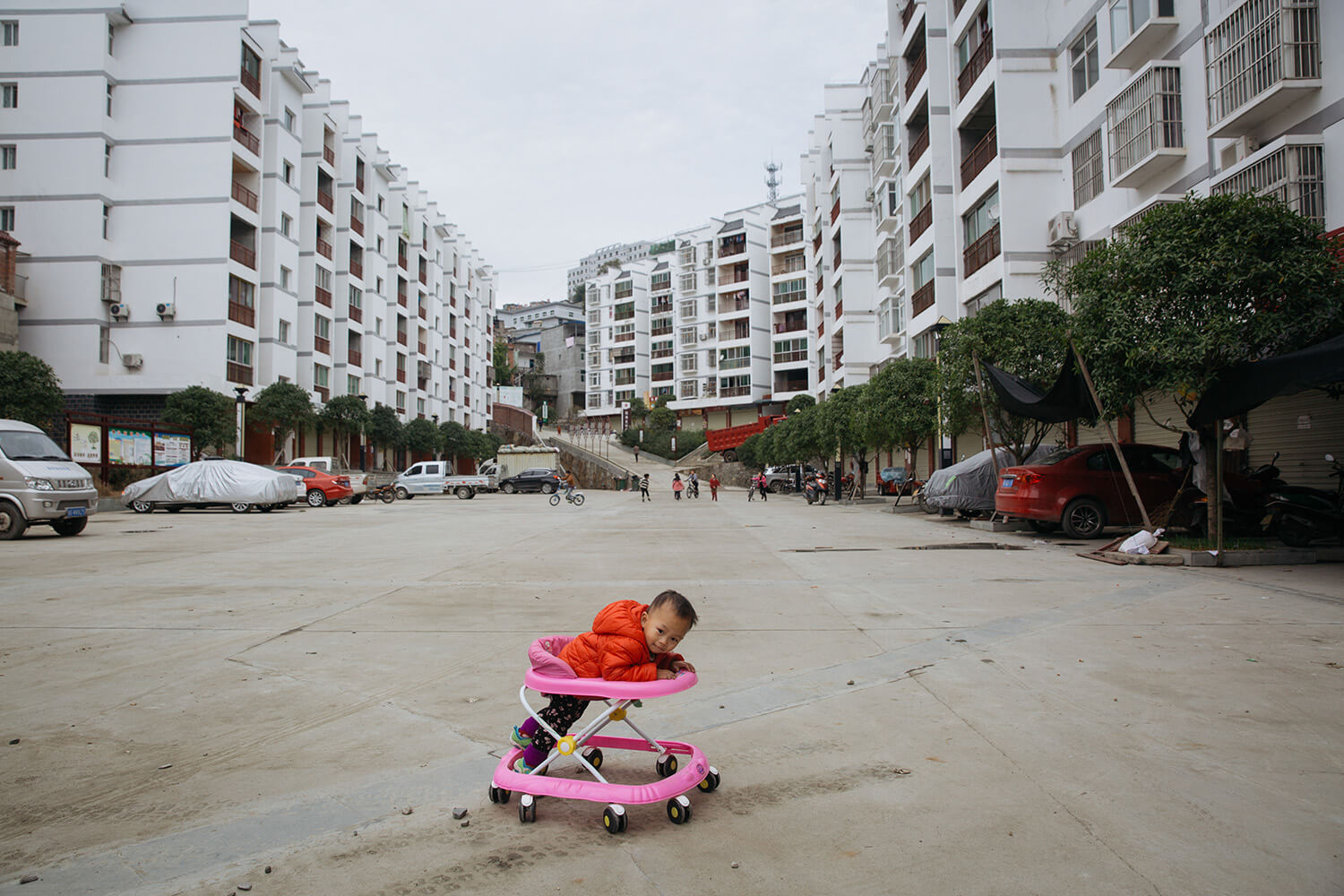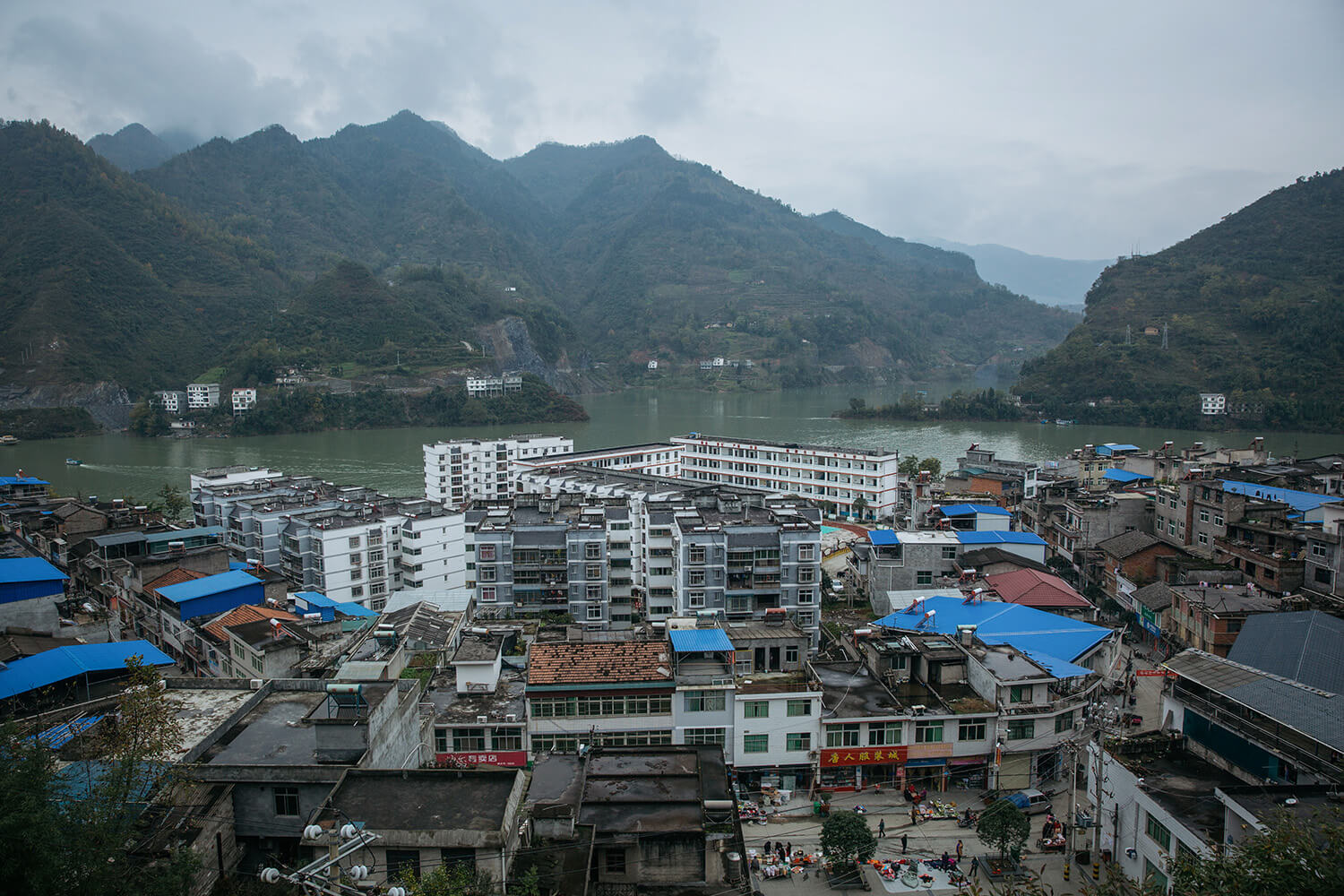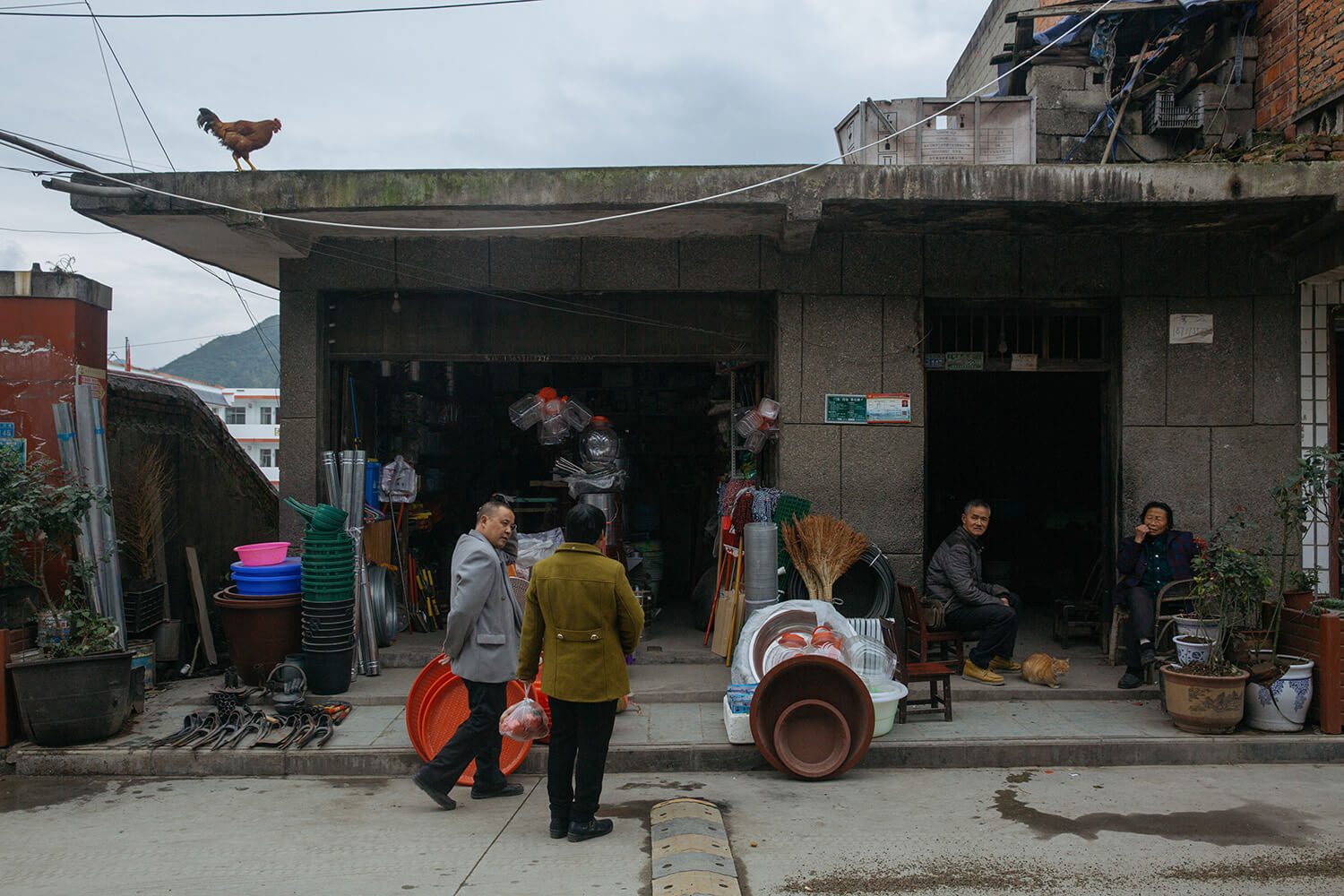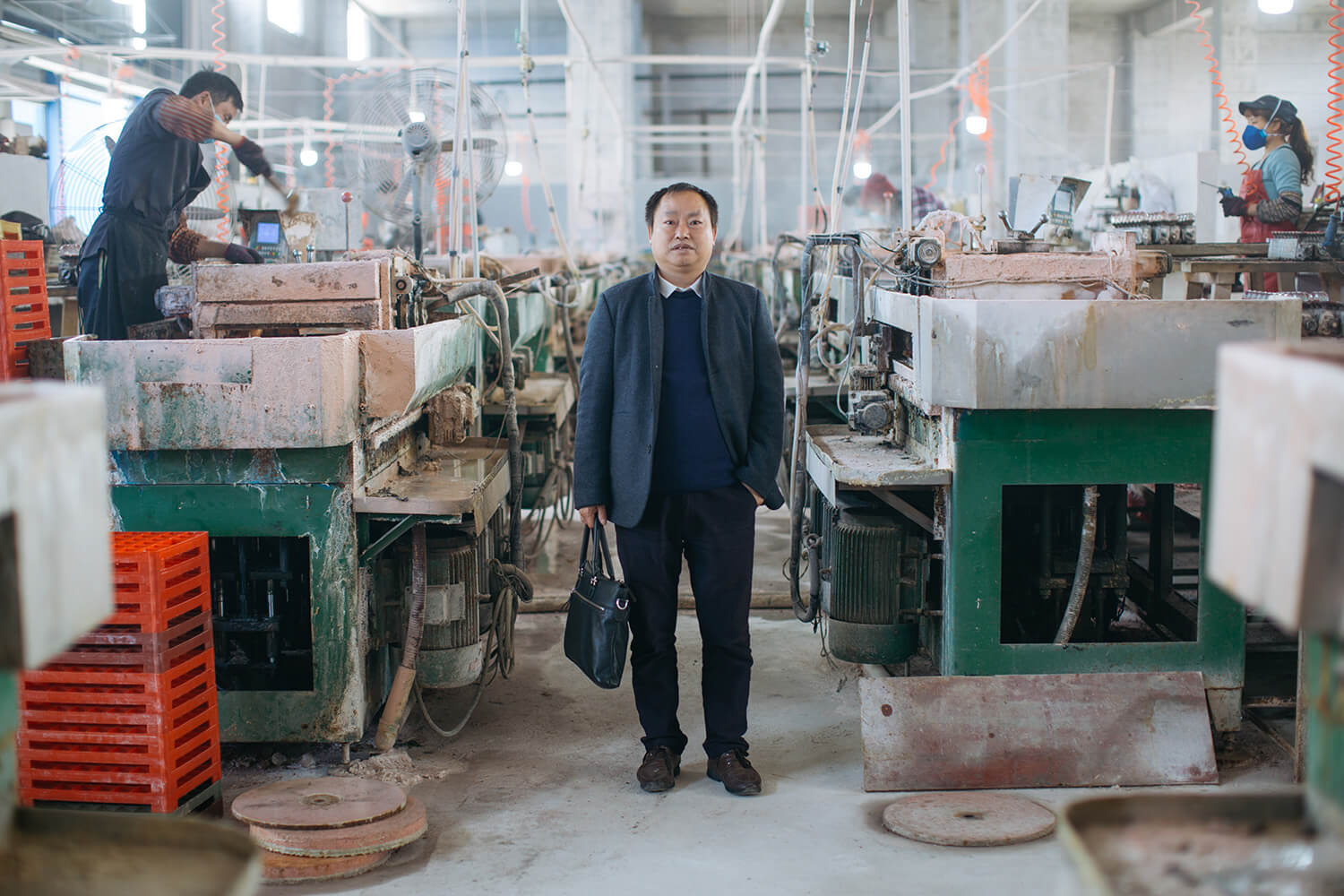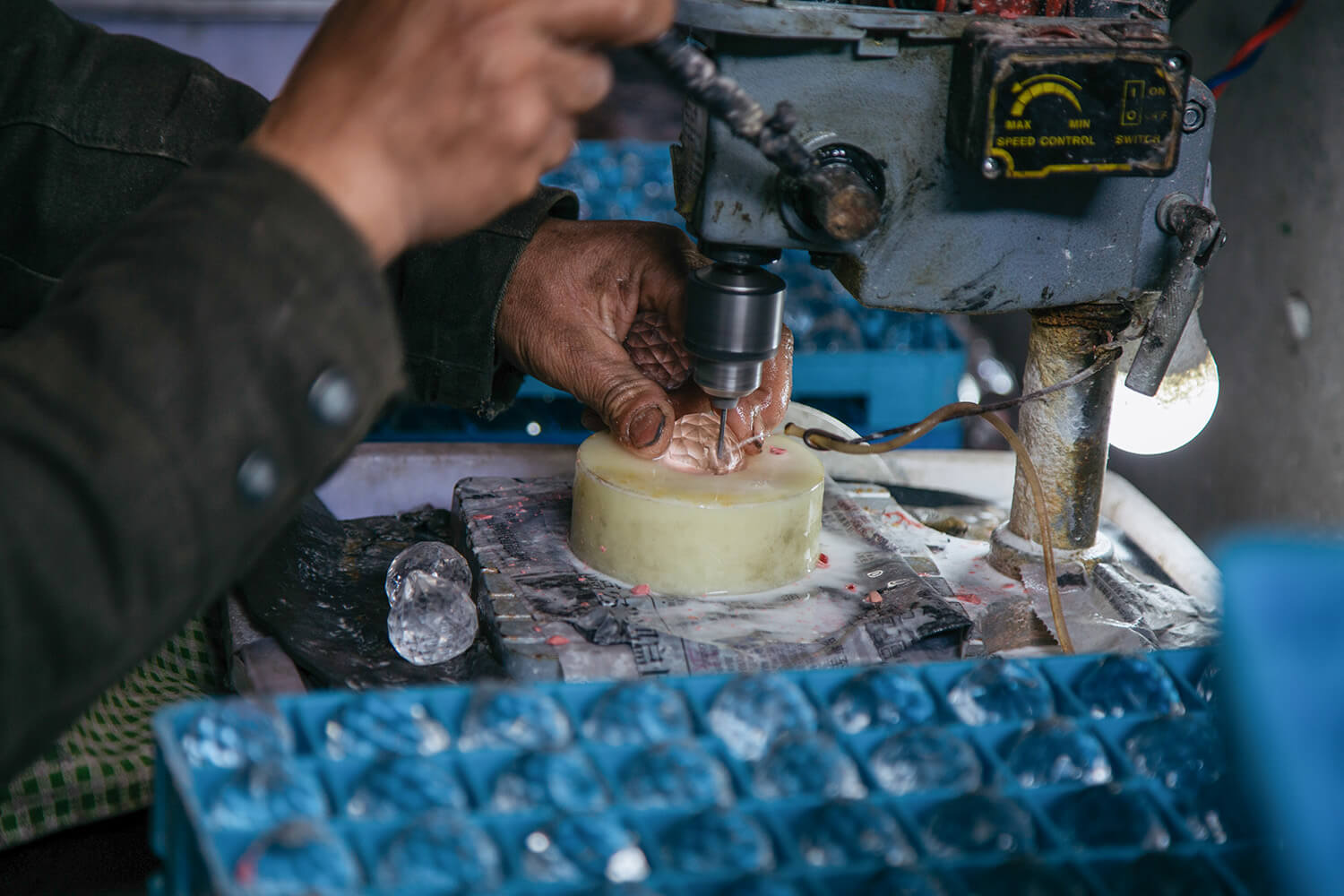

Over the last four decades, China’s economic reforms have lifted hundreds of millions of people out of poverty. Yet today, more than 16 million people in rural areas are estimated to still live in want, particularly in the country’s central and western hinterland.
The Chinese government has embarked on an ambitious project to eradicate poverty by 2020. To achieve this goal, officials plan to invest nearly 1 trillion yuan ($149 billion) and relocate 30 million citizens. As of the end of 2015, more than 12 million citizens had already been resettled.
The state claims that resettlement campaigns raise living standards, help impoverished communities engage with the market economy, provide relief after natural disasters, and protect the local environment. In many cases, these arguments seem convincing enough.
But in other cases, it’s more nuanced. Some citizens complain that local officials have forced them to resettle, that government relocation subsidies have been lower than promised, that new housing is lower-quality, or that they lack the necessary skills to participate in local industries. Others feel cut off from places they once called home, eking out more lucrative, but less fulfilling existences.
The modern Chinese state has a history of compelling citizens to relocate for its policy goals. Prior to the completion of the Three Gorges Dam, the government rehoused 1.4 million people from across central and southwestern China. Among other aims, the project sought to prevent flooding, generate hydroelectric power, and benefit inland shipping, but its environmental, social, and psychological impacts remain controversial.

Sixth Tone and its sister publication, The Paper, visited settlements in remote parts of central and northwestern China to speak to locals affected by relocation. Each area implemented central policy in a unique way, with varying degrees of success.
Ziyang, a mountainous rural county in northwestern China’s Shaanxi province, has long dealt with a shortage of arable land and frequent landslides. In addition, because it needs to protect its local river — Ziyang sits at the headwaters of the South-to-North Water Diversion Project — residents cannot pursue industrial development in the region. The local government’s solution? Train them to become pedicurists and encourage them to move to the cities.
Meanwhile, in central China’s Hunan province, the county government of Fenghuang has offered local entrepreneurs incentives to return home and start their own businesses. A state-funded industrial park built near the new resettlement community ostensibly provides jobs to formerly impoverished villagers. But many still prefer to work for months at a time in big cities, periodically sending money back to their families in Fenghuang.
Relocation is both fundamentally altering China’s countryside and accelerating China’s already-breakneck urbanization. In some places, high-rise apartment blocks sprout from former farmland. In others, once-bustling villages stand empty and dilapidated. What are the consequences for those swept up in the campaign?


Tang Diguo sits, exhausted, in the dimly lit company dormitory of a pedicure shop in downtown Shanghai, scrolling through panoramic photographs of Hongchun, the town in northwestern China near where he grew up. He pauses at a picture of a dozen or so identical gray and white apartment blocks in the middle of town. One of these apartments belongs to Tang, but he soon gives up trying to work out which one it is. “I can’t find my family home,” he says in a hushed voice. And no wonder: The 45-year-old has barely lived in it since buying it in 2012.
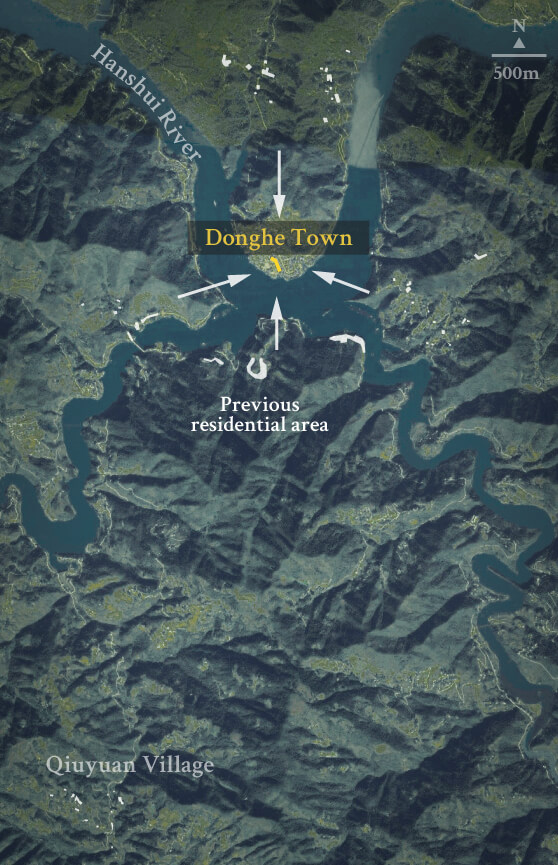
That year, Tang spent more than 200,000 yuan on a 120-square-meter home in this cluster of buildings, a 15-minute motorcycle ride from his home village of Jijiagou. He bought the home with a subsidy of 45,000 yuan from the local government, which planned to demolish Jijiagou and relocate its residents in Hongchun. Jijiagou, a village historically prone to natural disasters, was deemed unfit for habitation after a 2010 landslide wiped out a number of nearby villages in a matter of seconds. Tang says you can still see the scars left by the landslides on the region’s exposed mountainsides today. All 415 of the village’s households — some 1,500 people — were told to pack their bags and move.
Relocation not only forced Tang to bid farewell to his former home — a place for which he understandably feels a deep sense of nostalgia. It also redirected the self-proclaimed macho man into an industry he once held in mild contempt: foot bathing.
The government calls Ziyang a “national-level poverty-stricken county,” and with good reason: According to local statistics, in 2017, rural residents made an average of 803 yuan a month, a number that rose to just 2,294 yuan in the county’s urban areas. That year, 91,000 of Ziyang’s 342,000 residents were unemployed. Another 84,000 were working as migrant laborers outside the province, where salaries are usually higher.
Tang joined the exodus at 16. He had always hated farming and believed himself ill-suited to the hardship of a life spent toiling in the soil. Over the years, he labored in a Shanxi brickyard, opened a restaurant in the Tibet Autonomous Region, and worked in logistics in Guangdong. “If I didn’t go out in search of work, how was I supposed to take care of my family?” he says.
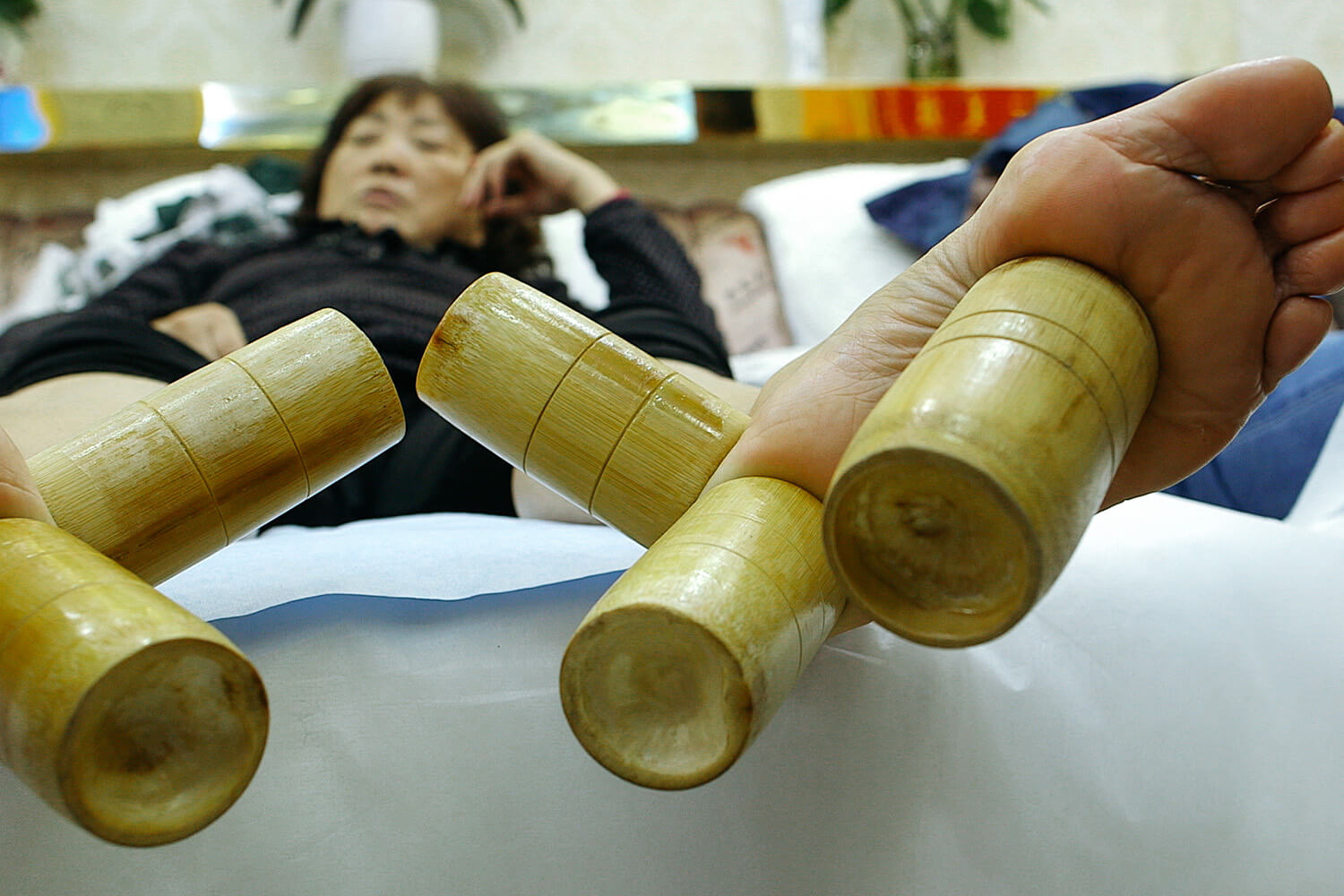
A customer gets a foot massage in a Zheng Yuanyuan Pedicures branch in Shanghai, November 2017.
Before coming to Shanghai in the summer of 2015, Tang says he imagined it “as a city paved with gold.” He turned out to be right: Within two years, he was making more than 10,000 yuan a month as a branch manager of Zheng Yuanyuan Pedicures, a shop with around 100 branches across China. It’s a full 3,000 yuan more than the Shanghai average for 2017, and roughly 10 times what he might have made had he stayed in his remote hometown. “Before, when I managed a team at a factory, I thought my salary was pretty high,” he says. “But I never imagined I’d ever earn this much.”
His high salary is partially the result of an initiative launched in 2014 by the Ziyang county government, offering local villagers free vocational training in giving pedicures. That summer, 70 students — including Tang and his wife, Luo Xuqin — completed one such course.
The county government continues to drum up support for its flagship retraining policy. All over town, slogans tout pedicures as a means of relieving the area’s historical reliance on backbreaking labor. “Don’t dig wells! Don’t dig mines! Study pedicures and get rich!” blares one.
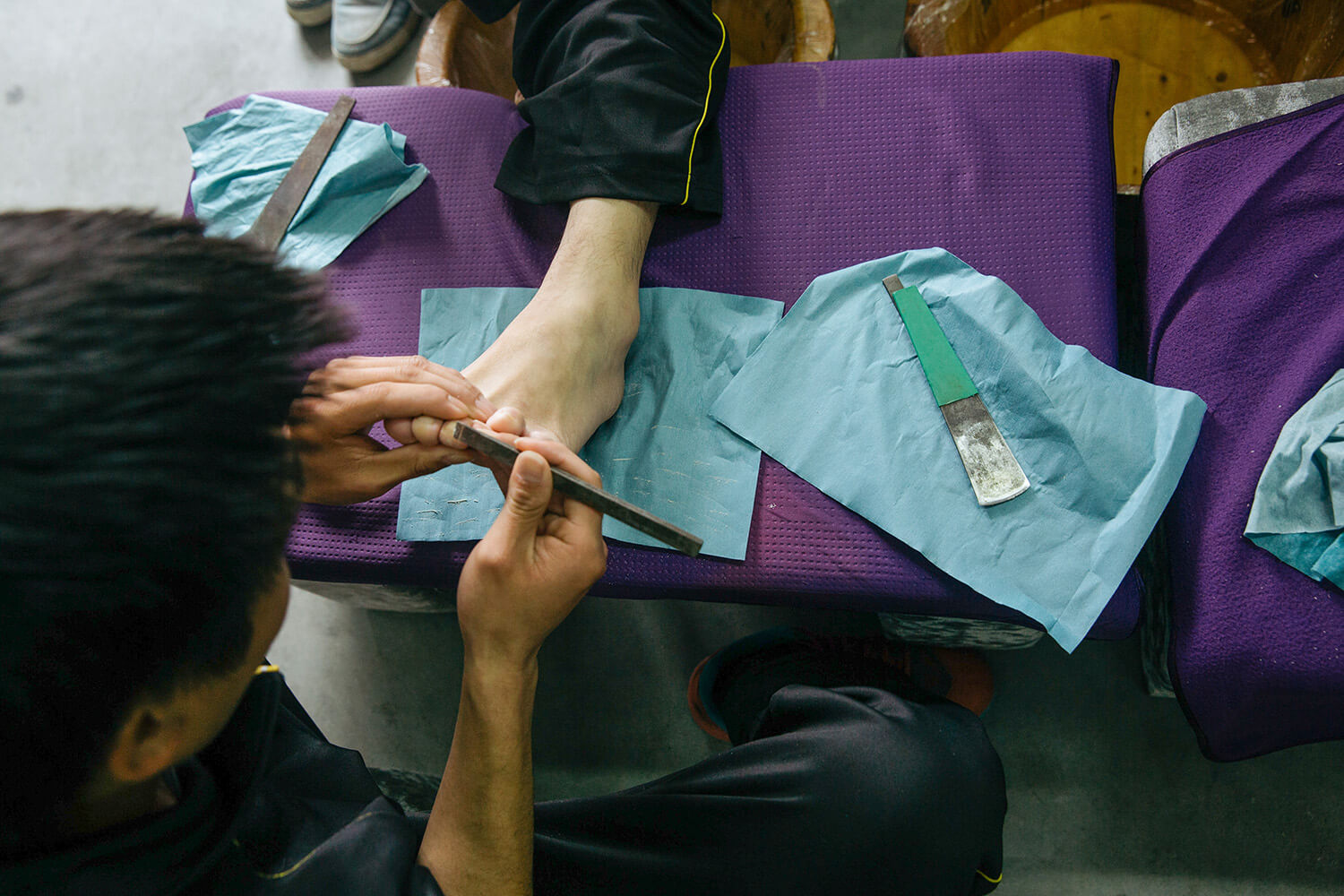
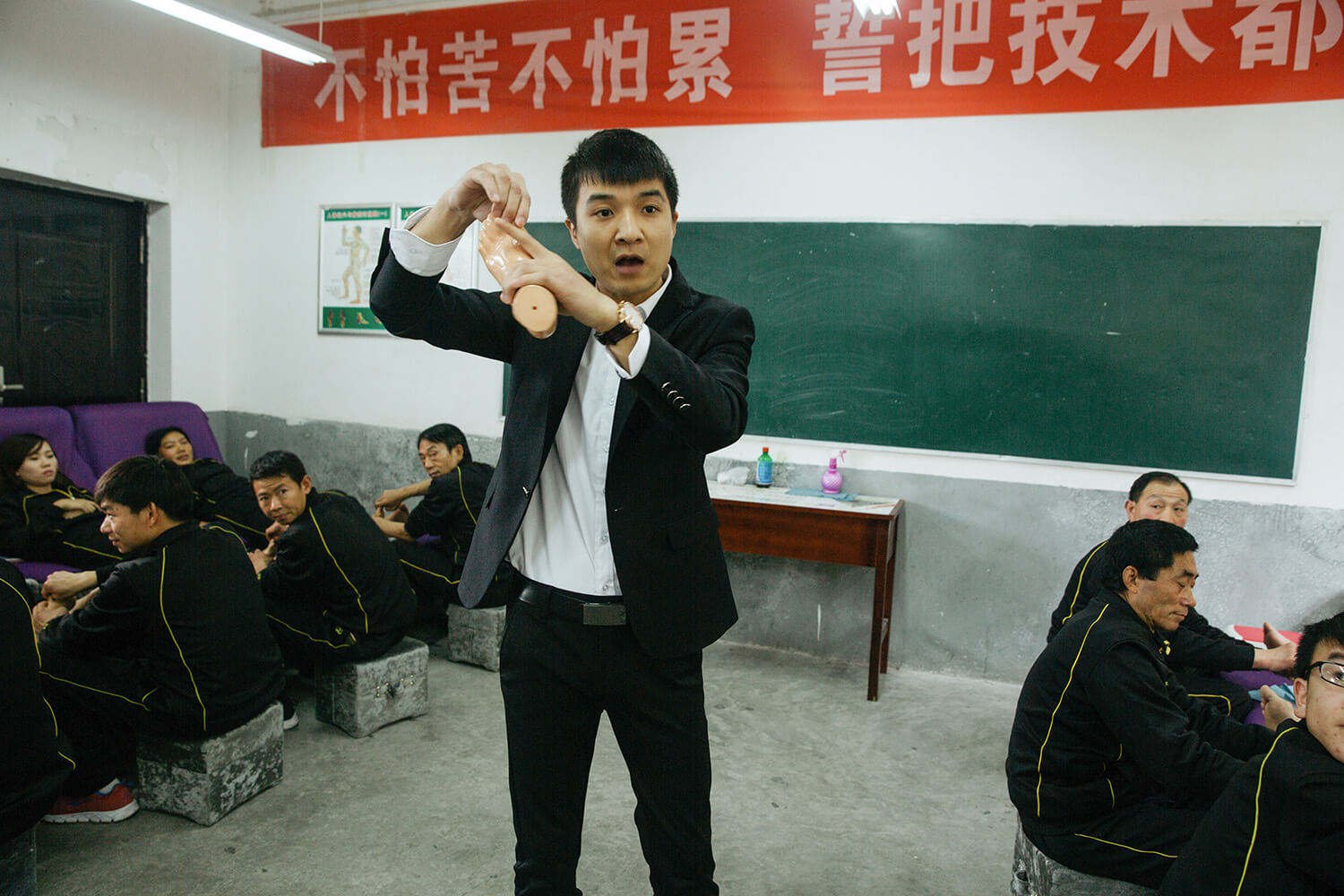
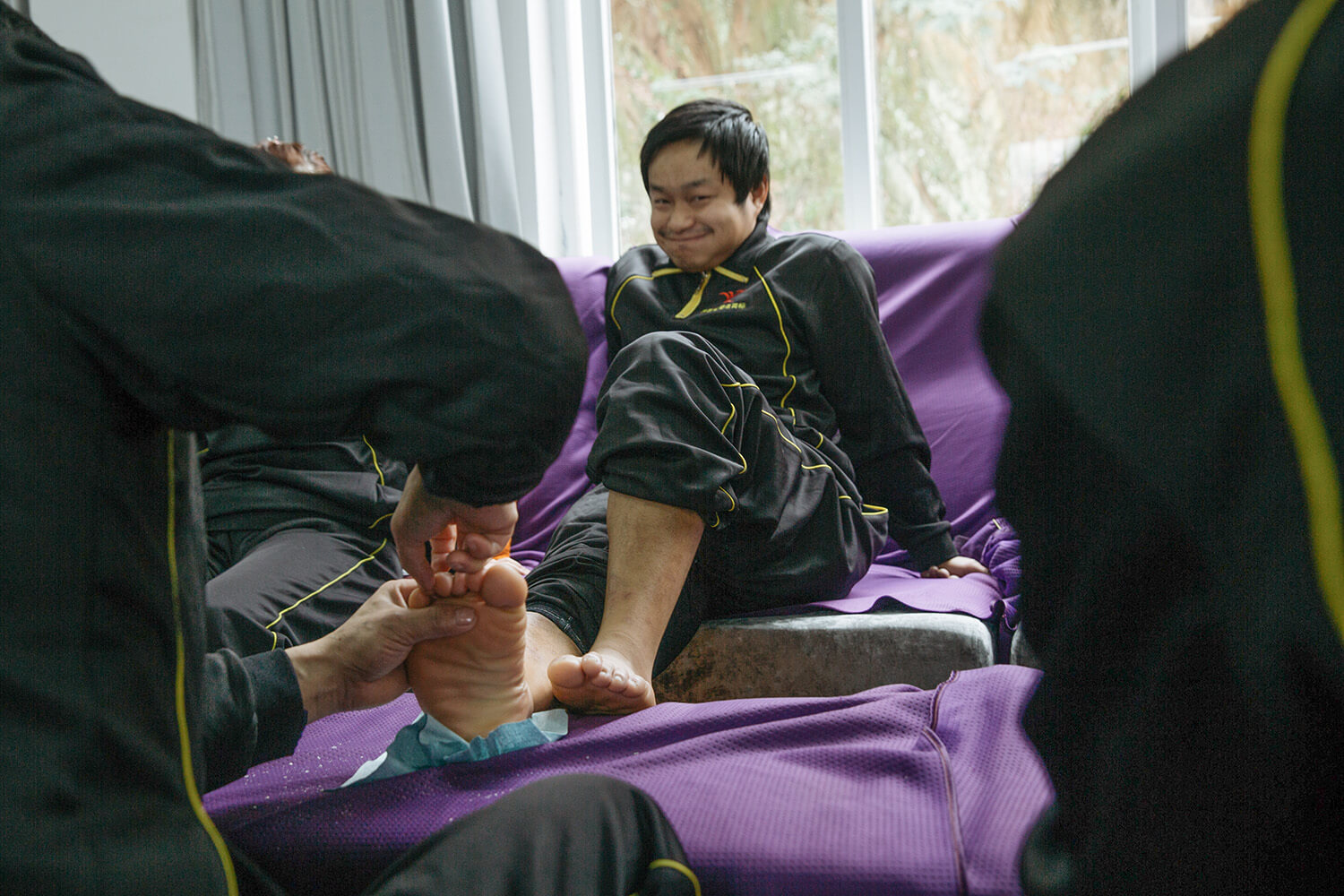
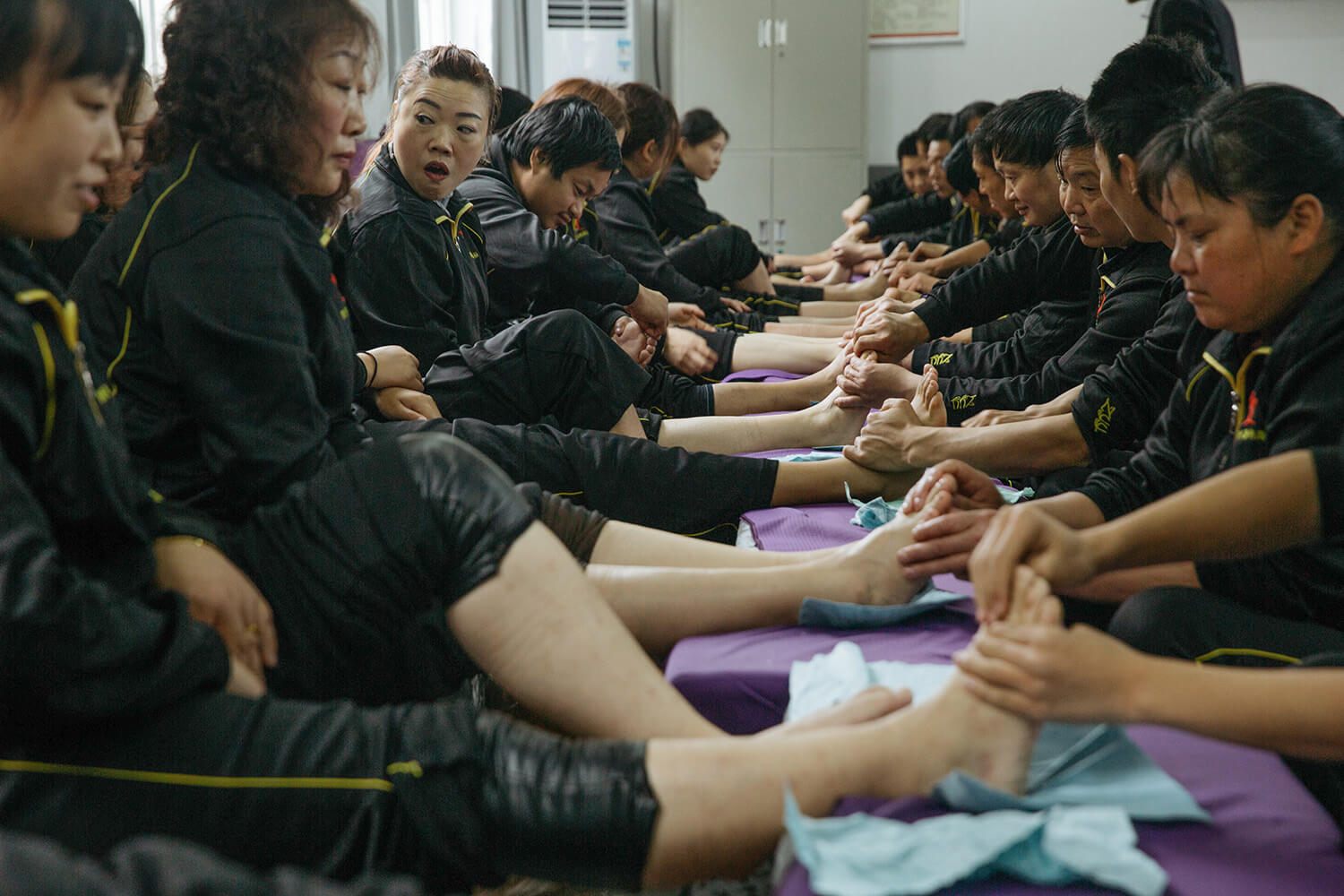
Students and teachers participate in a pedicure course in Ziyang County, Nov. 13, 2017.
At the center of the publicity drive is the story of a local businessman: Zheng Yuanyuan. The government claims that Zheng, born into a poor family in a nearby mountain town, threw off the shackles of poverty by mastering the arts of massaging feet, clipping toenails, and sanding down corns. Through hard work and application — the story goes — Zheng transformed himself into a poster child for rural entrepreneurship.
Although Ziyang’s vocational education center offers a wide variety of courses, including housekeeping, live-in nursing, and specialty cooking, none enjoy the same popularity as the pedicure course, students say.
But even after receiving his vocational certificate, Tang says he struggled to reconcile his new profession with his self-image as a man’s man. “It was embarrassing to wash other people’s feet,” he recalls. “I thought it wasn’t work fit for a man.” Instead, he got a factory job in the southeastern province of Fujian, manufacturing hardware fittings. The job quickly fizzled out, however, and he soon found himself back in his hometown.
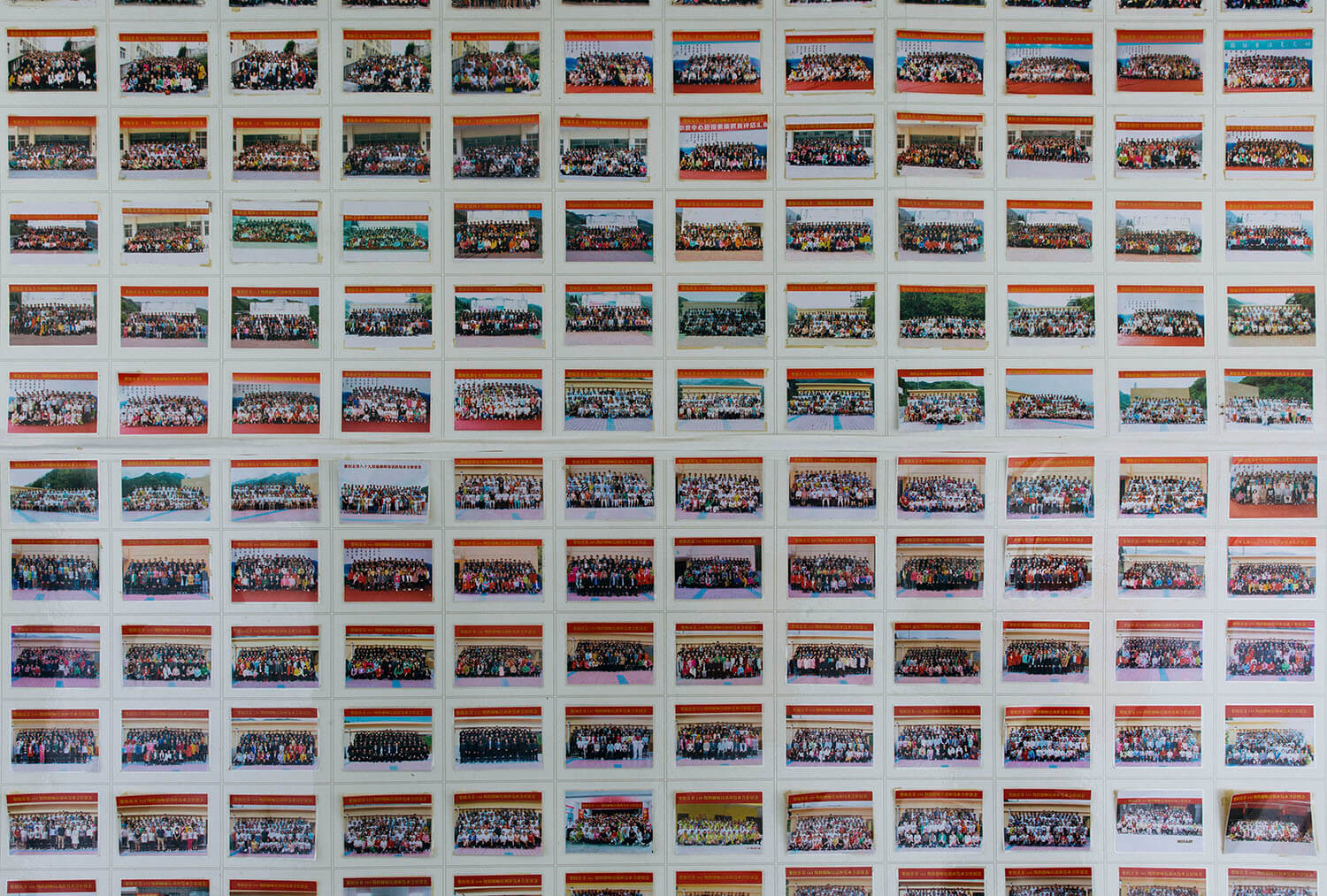
Class photos hang at a pedicurist training center in Ziyang County, Nov. 13, 2017.
Today, Tang and his family — including his wife and his two adult sons, Tang Tao and Tang Wei — work as pedicurists in Shanghai, and only go back home for Lunar New Year. Eight people are crammed into the 50-square-meter dormitory. The bedrooms are separated by gender; for the past two years, Tang and his wife have lived in different rooms in the same house. Tang takes the arrangement with his usual stoicism. “It’s inconvenient, but you can’t think about these things when you leave home; it is what it is,” he says. His wife seems equally resigned. She doesn’t enjoy the job’s long hours, according to Tang, but is staying on to keep her husband company.
As for their actual home, the family apartment isn’t solely for him and his wife. Tang says he bought it with his son’s future in mind. In China, families with sons often try to secure their children a house and a car to make them more competitive in the marriage market. “That house is capital he can use when it comes time to get married,” Tang tells me. Still, Tang grows wistful when the conversation turns in that direction. “We remodeled it nicely,” he says. “It’s a shame we only ever get to use it once a year.”
Like Tang, Chen Chunlian was one of Ziyang’s first residents to sign up for pedicure classes back in 2014. At the time, her family was being relocated from Qiuyuan Village to a new neighborhood near a riverside wharf in Donghe, another town in Shaanxi. Their old home was built from mud bricks, meaning it had to be repaired before the summer’s rain every year; their new home, like Tang’s, is in a modern, if slightly drab, concrete apartment block.
Thirty-four-year-old Chen has the breezy nature of many in her profession. Unlike Tang, she sees no shame in what she does. “There’s nothing embarrassing about making a living with your own two hands,” she says.
It’s my job. What does it matter if I like it or not?
Chen Chunlian, pedicurist
After a year spent working as a pedicurist, first in the eastern city of Tai’an and later in the much larger central city of Changsha, she returned to Donghe in 2015 to look after her two school-age sons. There, she opened her own shop: Hongxiang Pedicures.
At first, like many young female returnees, Chen grew bored with the tedium of everyday life in the tiny town. Her husband, Chen Shibing, was still working elsewhere as a construction worker, and there was little for Chen to do apart from housework and cooking. So, she got a job at what was then the only pedicure shop in Donghe. Later, she decided to strike out on her own and convert her home into a pedicure shop. Her choice was based more on a desire to pass the time and make some money than any passion for the trade, however. “It’s my job. What does it matter if I like it or not?” she says. On average, she earns between 3,000 and 4,000 yuan a month, but can double that amount during peak periods like Lunar New Year.
To better care for her sons and parents-in-law, 34-year-old Chen Chunlian moved back to her hometown in Ziyang County, Shaanxi province, after being away for several years. She opened a pedicure shop from her apartment, which she had bought six years ago thanks to a preferential government policy.
September is not one of those periods, however. It’s around three or four in the afternoon, and there are no clients around; her son invites a few classmates over to watch TV as a string of Chen’s friends drop by to say hello. Few of them seem to see any point in thinking about their former lives. Now that her parents have joined her in Donghe, Chen rarely makes the trip back to her village. “I miss it sometimes; the environment was good there, and the air, too,” she says. But she points out that her new apartment has a more convenient location, and town-life offers more opportunities for her sons.
Her friends are equally indifferent toward their choices to buy a house in a town like Donghe, rather than in the larger, but more expensive, county seat. When asked if she’s concerned whether her newly bought house would retain its value, Chen’s neighbor, Shan Qin, responds with a shrug: “It’s always worth it if you can get a government subsidy.”


On a chilly day in October 2017, Long Guoying’s motorcycle sputtered out of his home village of Dayujing, in central China’s Hunan province, and started down the 45-kilometer road to the town of Alaying. Other villagers from miles around converged in the town center, some carrying children on their backs to help them see above the throng. That day, the town government was holding a lottery to distribute homes in a newly built residential community to the local villagers.
The government is resettling everyone in Dayujing. Most residents have moved to another nearby town, La’ershan, but Long’s family instead applied for Alaying, having heard that officials there planned to bring in new companies and compel them to employ resettled people. Long hoped to get a piece of the action: “One of my relatives says there’s a factory being built in Alaying, and I could get a job out of it. It’s also more convenient for my kids to go to school there.”
Until 2017, when a road was built from downtown La’ershan to Dayujing, village residents had to walk two hours from a bus station built on a nearby highway. The Longs’ former family home was a two-story wooden structure typical of their Miao minority heritage and was built at the end of a long mountain road overlooking a small reservoir. Bags of grain were piled next to the front door, and strings of corn hung from bamboo poles stretching across the porch. Apart from Long Guoying and his wife, Long Jifeng, it was home to his two children, his elderly parents, and his two brothers.
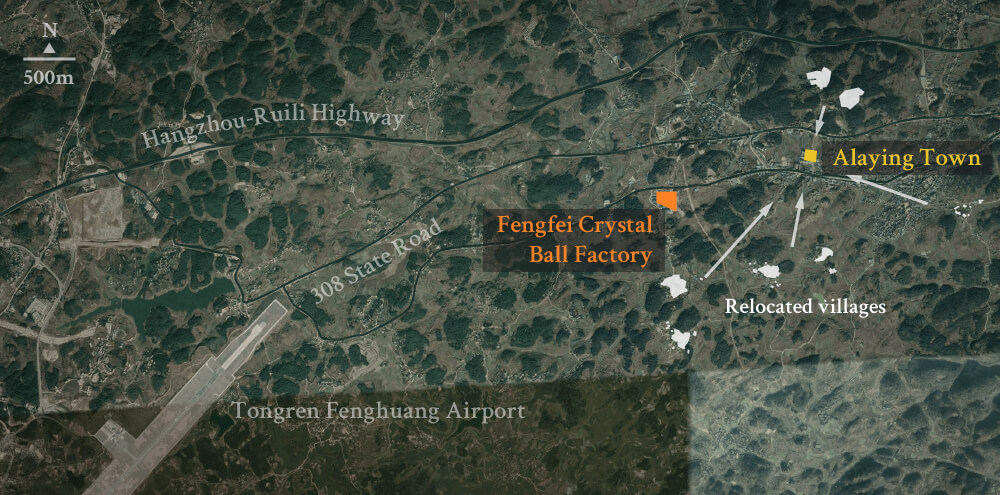
That autumn day in Alaying, Long Guoying collected the allotment numbers for his and his father’s new apartments. Afterward, he lingered by the side of the road, gazing at the new development from a distance, before getting back on his motorcycle and heading home.
Thirty-five-year-old Long Guoying dropped out of school at 15 without graduating. He spent several years doing odd jobs in his home village of Dayujing, before eventually heading to Wenzhou, a city in the eastern province of Zhejiang. While working in a small metal fittings factory there, he met his wife.
In recent years, many villagers in Dayujing have renovated their old homes, Long Guoying says. But he and his wife don’t earn enough money in Wenzhou to do the same, and his family can’t spare the labor anyway. Long Guoying is the oldest of three brothers: The second-eldest, Long Jianshu, is unable to work due to long-term health issues; the youngest has only just started working after graduating from a vocational college; and his parents are too old.
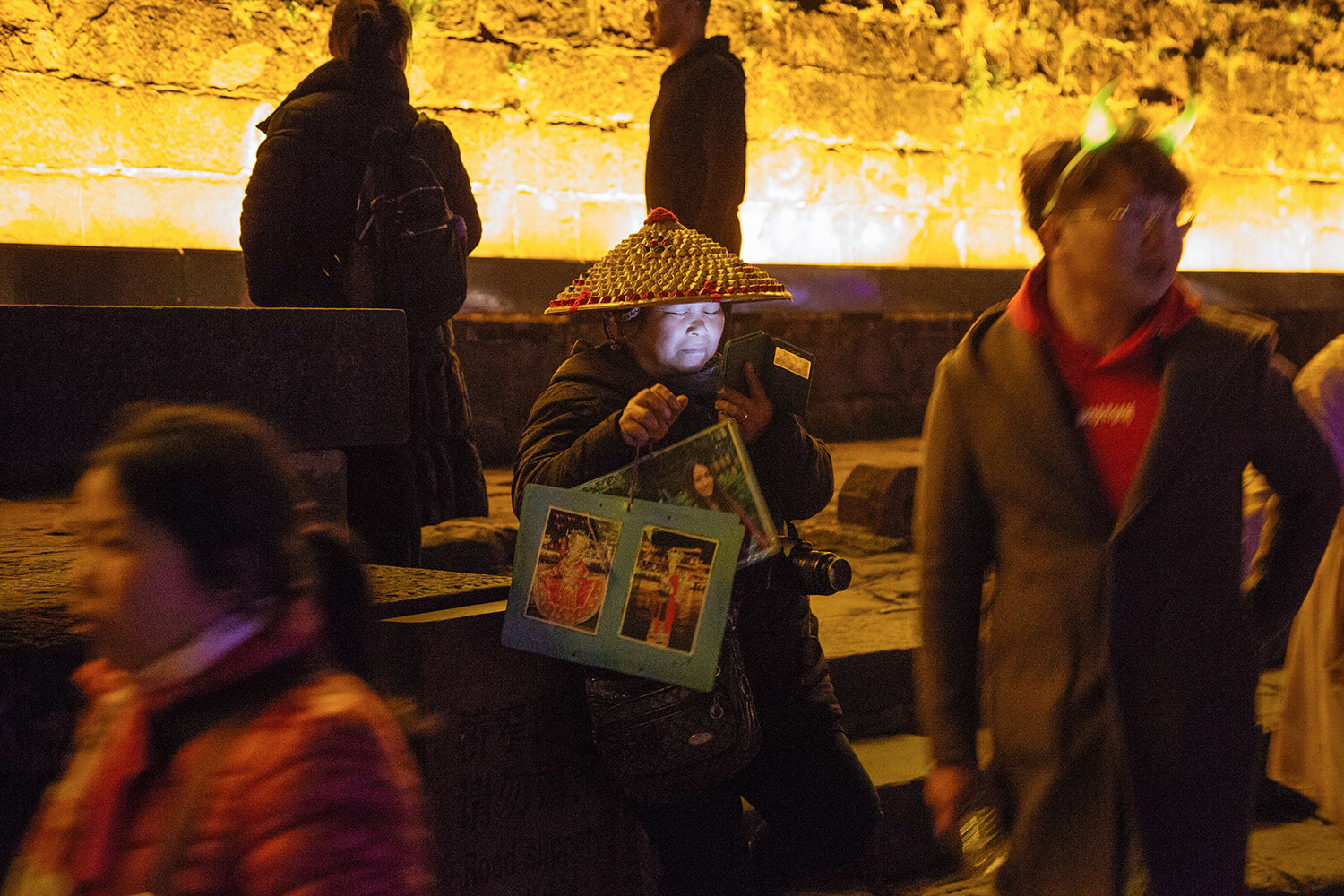
A woman waits for tourists to take souvenir photos at Fenghuang County, March 20, 2018.

A man looks at a selfie at Fenghuang County, March 22, 2018.
In Fenghuang, the county in which Dayujing and Alaying are located, the government pays a standard subsidy of 35,000 yuan to all families willing to move into new accommodations — most of which are valued at around 100,000 yuan. If applicants agree to have their old homes demolished after relocation and hand the land-use rights back to the state to convert into farmland, they will receive a further 10,000 yuan.
People in the village had to persuade me to move, because we definitely won’t return here again.
Long Guoying, villager
Long Guoying raided his savings for two 10,000 yuan deposits on a pair of apartments in Alaying — one for his family, one for his aging parents. It wasn’t an easy decision to make. Like many rural Chinese families, the Longs remain deeply attached to their homes and are reluctant to leave. Historically, the land was their economic lifeline. Long Guoying remains highly protective of the family’s cornfields: “Our ancestors lived here for generations. People in the village had to persuade me to move, because we definitely won’t return here again.”
When we visit Dayujing, Long Guoying sits on a bamboo chair at home, his hands clasped together. Long Jifeng sits opposite him; she has spent the morning in the fields, and her rough hands methodically brush the dust off her pants.

An abandoned house in Alaying Town, March 22, 2018.
In Wenzhou, Long Guoying and Long Jifeng lived with other migrant laborers from the village. Whatever they didn’t spend on rent and basic living expenses, they sent home to care for the rest of the family. In a good month, the couple would send around 5,000 yuan back to Dayujing.
Such family dynamics are common in rural parts of central and western China. Traditionally, three generations of the same family occupy a small, often-unproductive plot of farmland. Since the government liberalized the economy in the early 1980s, millions of able-bodied workers have migrated away from rural areas to support their families. The elderly, infant, and invalid are left behind in the village.
Until recently, Long Guoying and Long Jifeng were the only two people in the family who worked. They felt immense pressure to support the household of eight. But in 2016, disaster struck: While working in the metal fittings factory, Long Guoying got a herniated disc in his spine. “The doctor said I couldn’t work with it. I’d have to rest,” he says. “So, we came home. After that, our financial situation took a turn for the worse: I couldn’t do anything, and we had no money. But I had to find something to do.”
So, in early 2017, the Longs borrowed money from relatives to buy 100 sheep, pasturing them on a nearby mountain. But, with no prior experience of raising the animals, they botched it. They bought their sheep in spring, when the price was at its highest, only to see the price of mutton fall dramatically in summer and autumn. The family panicked and sold their sheep for a combined 40,000 yuan just before Spring Festival in 2018. After paying back their loans to their relatives, Long Guoying estimates that the family lost around 10,000 yuan from the venture.
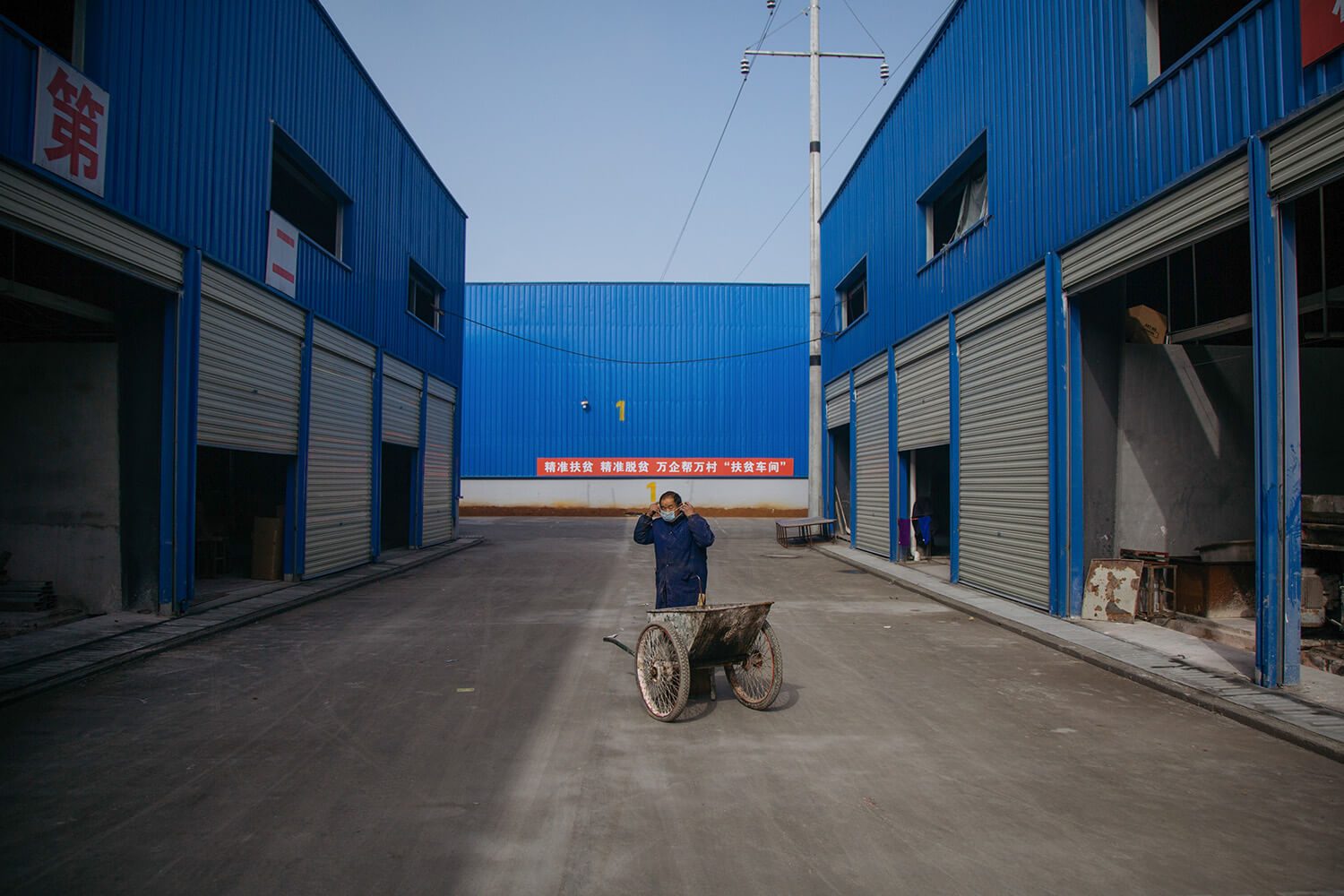
A relocation employment area in Alaying Town, March 22, 2018.
As the Chinese government relocates millions of rural residents in the name of poverty relief, concerns circulate around whether the campaign is suited to the needs and experiences of local residents. Although comfortable, cut-price housing provides a quick, short-term improvement for living conditions, it also pushes many families into new locations and industries for which they have little experience.
The most effective way to provide relief is to give people jobs.
Ma Yuxin, former deputy township head of Alaying
Ma Yuxin, the former deputy township head of Alaying, headed up the poverty alleviation campaign from 2015 to 2017. “The most effective way to provide relief is to give people jobs,” he tells The Paper, Sixth Tone’s sister publication. “Once people are getting monthly salaries, they emerge from poverty very quickly. So, we have an agreement with local employers: They have to provide jobs for impoverished families.”
One such company is the Fengfei Crystal Ball Factory, a lighting company established by Fenghuang-born entrepreneurs. Until 2012, Fengfei was based in eastern China’s Zhejiang province, but after the provincial government launched a crackdown on dust-emitting small-scale workshops, the company moved, first to the southwestern province of Guizhou, and later to Fenghuang, after the latter incentivized locally born entrepreneurs to relocate their businesses to their hometowns. Fengfei currently employs 600 local workers, 85 percent of whom hail from impoverished households in Fenghuang.
Xiang Shaohua, a manager at Fengfei, has high hopes for the future of the factory. “Once we’re running at full capacity, we’ll control more than two-thirds of the national market for our kind of light fixtures,” he says. The piece rate for machine operators allows some workers to earn as much as 6,000 yuan a month, around three times the average salary in the county.
But the Longs didn’t apply to work at Fengfei. “I went to check out the factory, but what Fengfei does is so different from what I did before,” explains Long Guoying. “We probably couldn’t master the machines there. I worry that we wouldn’t make enough money.” In the end, the couple decided to return to Wenzhou for one last stint, despite Long Guoying’s worsening back pain. Long’s younger brother also ignored Fengfei’s overtures and took a job as a waiter at a hotel in the nearby city of Fenghuang.
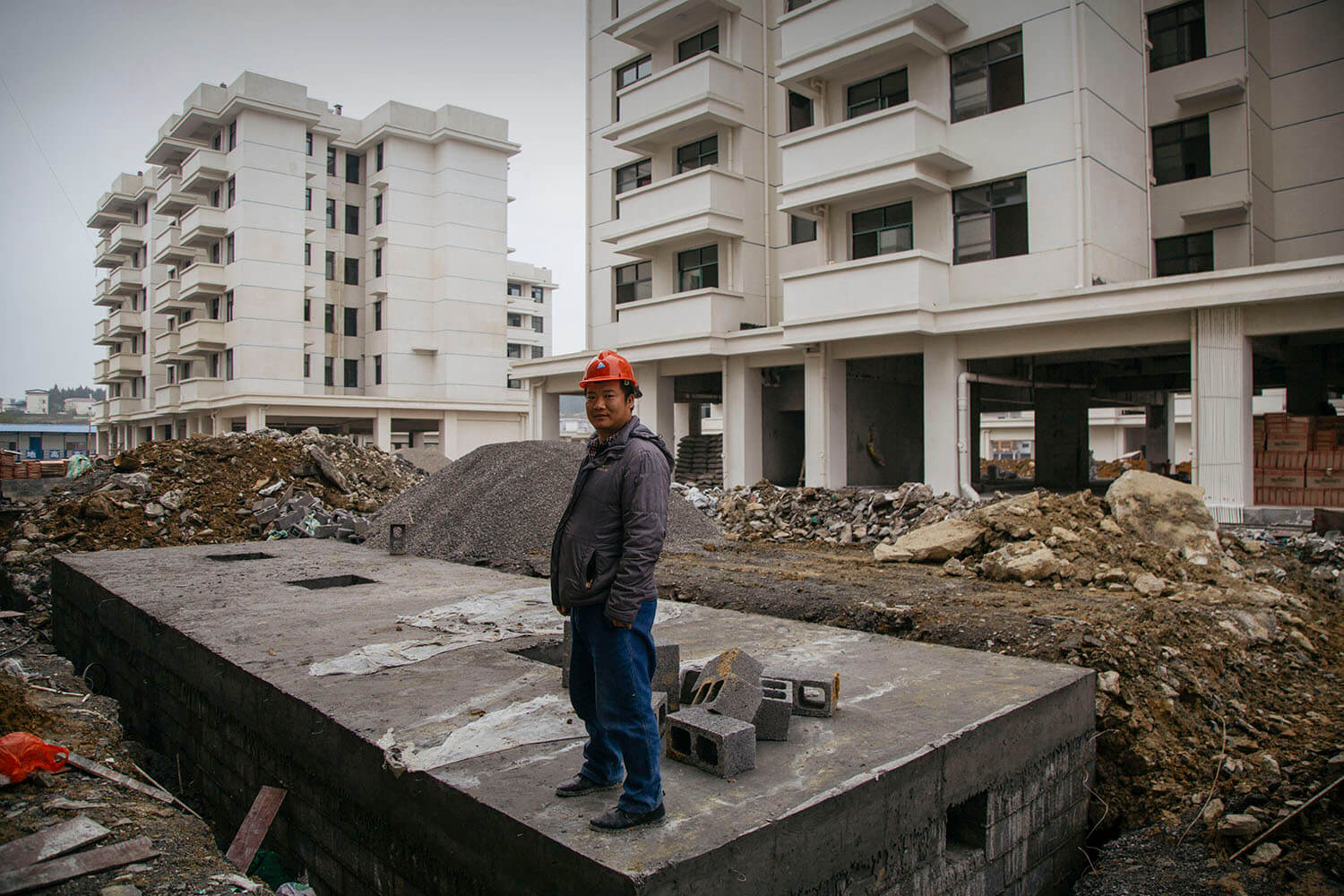
A worker poses for a picture in a residential area still under construction in Alaying Town, March 21, 2018.
At the end of May, the Longs collected the keys to their new apartments in Alaying. Long Guoying, Long Jifeng, and their two children live in the larger apartment, while Long Guoying’s parents and two brothers live in a smaller one nearby. Long Jifeng says that Long Guoying’s father was so curious about his new home that he moved in before the electricity had even been switched on. “He lived there for a week by candlelight, just to experience it,” she says.
The lights have come on since then, but they’re usually switched off in Long Guoying’s own apartment. Neither parent works in Alaying, and the children, when they’re not at school, stay in their grandparents’ apartment. Relocation has given the family a new home, but like many of Alaying’s new residents, they seldom actually use it.




